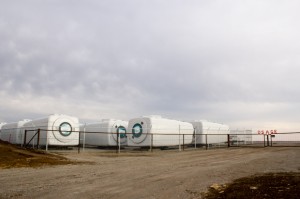Wind Projects in Osage County Dividing ‘Neighbors and Families’
-
Joe Wertz

Joe Wertz / StateImpact Oklahoma
Turbine nacelles for an wind farm project at a staging area in Osage County.
Wind energy companies have high hopes for Osage County. It’s windy, of course, but unlike other windy areas of western Oklahoma, Osage County is a lot closer to the heavy-duty electrical infrastructure needed to transport power from turbines to the grid.
Wind farms have met resistance in other Oklahoma communities, but opposition to the Osage County projects has been particularly fierce because the region is ecologically sensitive and culturally significant. The Oklahoman‘s Paul Monies reports:
Opponents of the two projects by Kansas-based TradeWind Energy Inc. said they endanger the natural beauty of the tallgrass prairie, its fragile ecosystem and the cultural history of the Osage Nation. The area is at the southern edge of the Flint Hills, the last sliver of the natural tallgrass prairie that at one time covered 140 million acres in North America.
Construction on one wind farm, the Osage County Wind Project, is already underway. The Mustang Run wind farm, however, was recently denied a conditional use permit by the Osage County Board of Adjustment — a decision the company is appealing in district court, Monies reports:
The Osage Nation has opposed the wind developments from the start, with tribal officials worried about the disturbance of cultural sites and how the 400-foot turbines might affect bald eagles, whose feathers are of prime importance for spiritual and naming ceremonies.
The Osage Nation is also worried that wind farms could interfere with oil and gas development:
The Osage Nation, through the Osage Minerals Council and its shareholders, owns the mineral rights for all of Osage County. The federal Bureau of Indian Affairs regulates and manages oil and gas production in the county.
The rancor has attracted legislative scrutiny and pitted neighbor against neighbor. Joe Bush, who StateImpact interviewed in March, was eager for the royalty checks the Mustang Run project would have brought him. He expressed similar sentiments in The Oklahoman interview:
Bush said the lease payments would help ride out the tough times faced by ranchers like himself, who continually deal with the cyclical nature of the cattle business and periods of prolonged drought. The additional property tax revenue also will help local schools, he said.
But some of Bush’s extended family — who own property near the proposed wind farms — don’t agree, Monies reports:
“People call them wind farms, but there’s nothing bucolic about them,” Ford Drummond said. “It’s an industrial process. We’ll lose our open areas, and with those flashing lights we’ll lose our night sky.”
